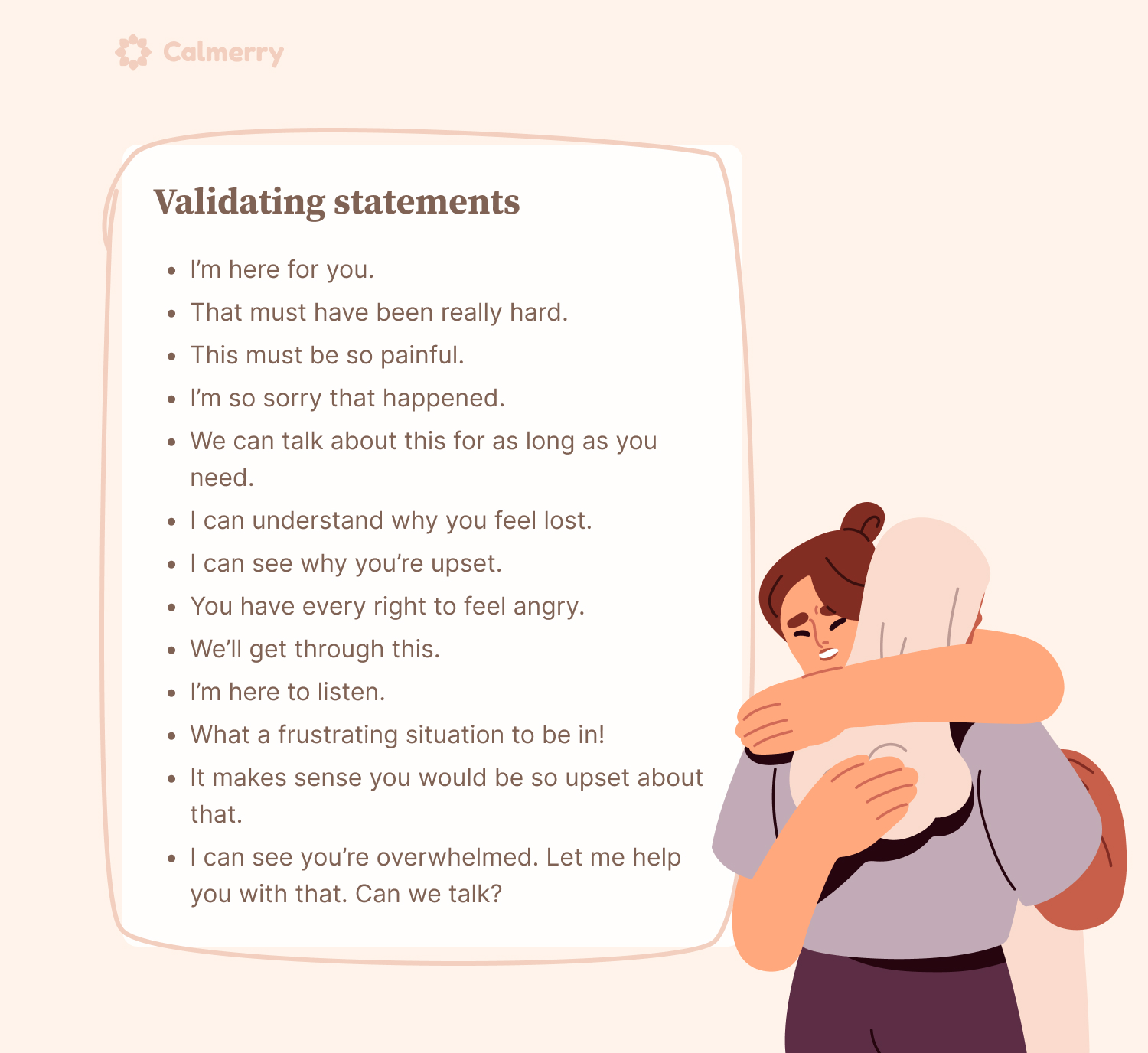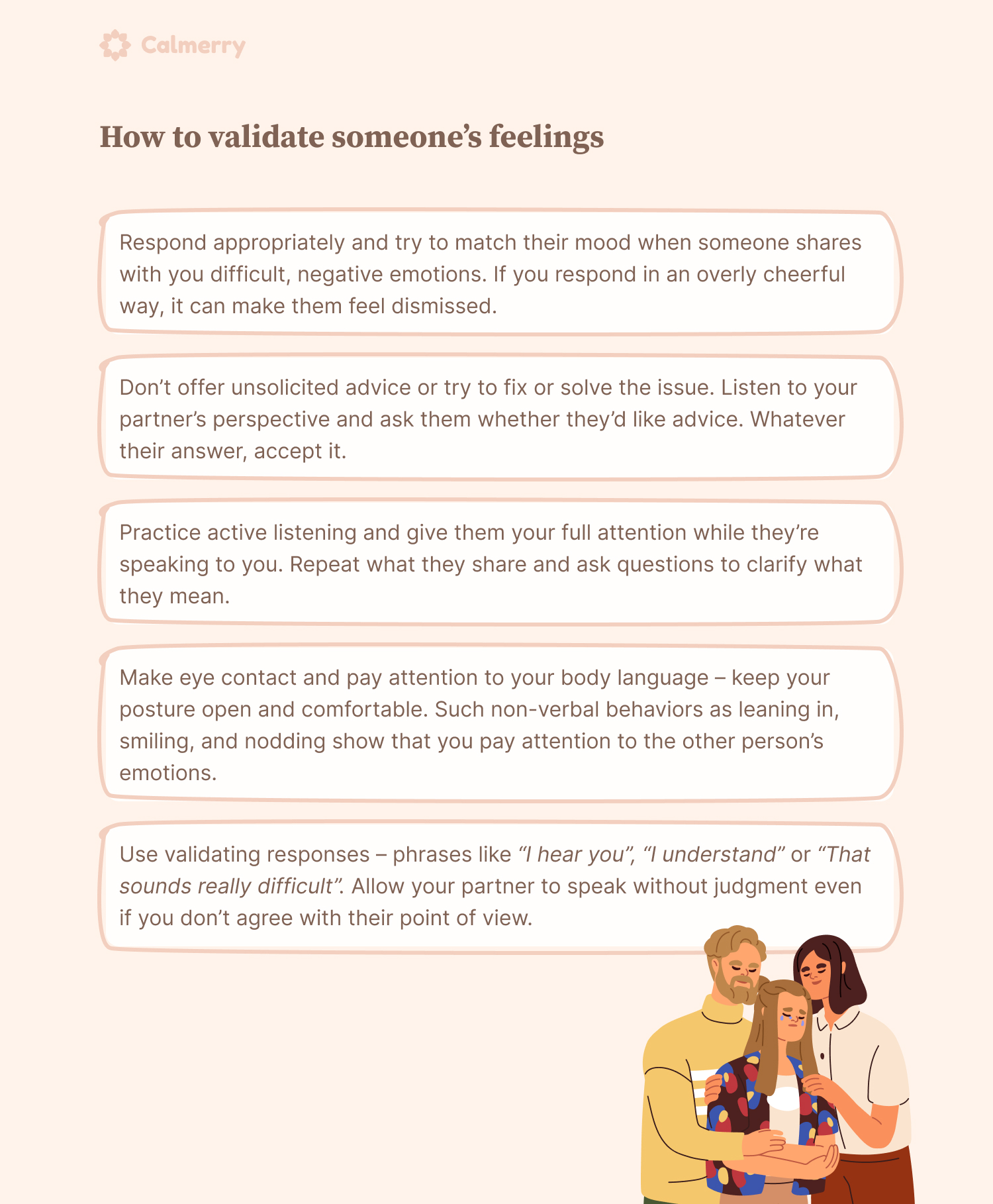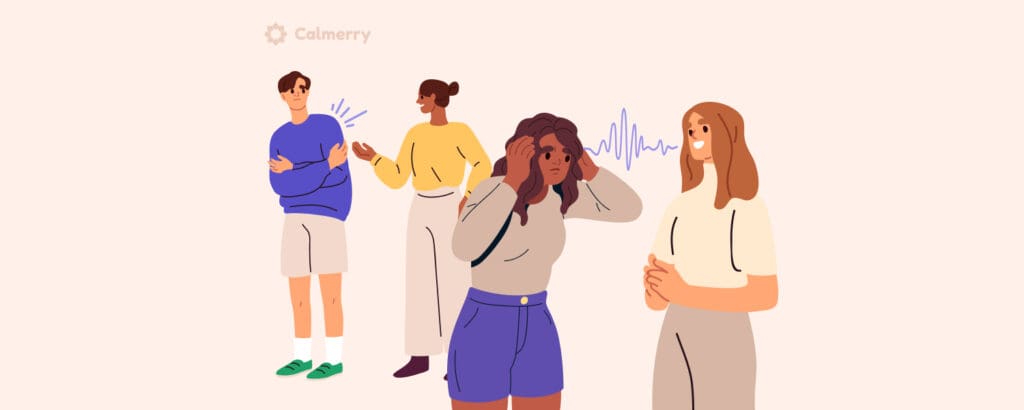The Power of Emotional Validation: Why We Need It and How to Practice It

In this article
Regardless of their age, gender, or background, everyone wants to feel that their feelings matter. We as humans have a need for connection and need to be heard and appreciated. We want to know that our emotions, thoughts, and feelings are accepted and understood.
Emotional validation helps us feel supported and cared for and has the power to calm fears and concerns. It’s a critical component of healthy relationships and one of the most valuable parenting skills.
What is emotional validation?
Emotional validation is the acceptance of a person’s inner experience, thoughts, feelings, and emotions as valid and understandable. It involves genuinely listening to someone express their emotions (even if they’re negative) without ignoring, rejecting, dismissing, belittling, or judging them.
Effective validation identifies a specific emotion that someone is experiencing and offers justification for feeling that emotion.
Validating a person and acknowledging that you hear them doesn’t necessarily mean that you agree with their subjective reality or that you think their emotional response is warranted. You don’t have to adopt the feelings of the other person as your own. You just accept their right to have those feelings, and implicitly or explicitly, tell them that you emphasize their emotions.
Internal validation vs. external validation
Validation can come from other people (external validation) or from within (internal validation or self-validation).
Internal validation involves recognizing and accepting your own internal experience, thoughts, and feelings without judgment and treating yourself with kindness.
External emotional validation plays a crucial role in early childhood as it allows a child to develop their personality. Parents who validate form an emotional connection with their children and create a safe space in which their children feel comfortable expressing strong emotions. As a result, kids develop a sense of attachment security, which is associated with many social and emotional benefits in adulthood.
Emotional invalidation and its effect on relationships
Emotional validation is distinguished from emotional invalidation when a person’s thoughts, feelings, emotions, and behaviors are dismissed or rejected. Invalidation of feelings can be upsetting and painful – when you reject someone’s right to have their feelings, it can make them feel ignored, unimportant, and isolated and lead to low self-worth or feelings of shame.
Invalidating feelings is a toxic behavior that may be considered emotional abuse.
Over time, invalidation may trigger insecurity in some people who may lack a sense of self-validation and may turn them into validation addicts that have a constant need for validation. They’re always looking for external validation to feel good about themselves and rely completely on outside approval for their sense of self-worth.
How to practice emotional validation
Emotional validation is an important skill for communicating understanding, empathy, and acceptance, and it requires practice. Improving this skill can strengthen your relationships with your partner, children, and friends. It can also help you validate your own thoughts and feelings.
So how can you practice emotional validation? Consider these key strategies.
If a person is struggling, identify and acknowledge the emotion they’re having
You might need to ask them if they haven’t clearly communicated their feelings, or guess and ask them to clarify. For example, you may say: “I can see that you’re really upset” or “You seem very angry. Is that what’s going on?”
Ask the person about the situation that triggered their emotion
You might say: “What is it that is making you feel that way?’’ or “Do you need anything? How can I help?” If your partner can’t communicate clearly what’s causing their response, you may say that something seems to be making them upset, but you can’t understand what it is without a clear picture of the situation.
Validate the emotion and offer justification for feeling it
Show them some empathy even if you feel you are the target of their negativity or think that their response is disproportionate to the situation that triggered it. For example, you may say: “I would have felt the same way” or “I would be upset too” or “That must be really hard.” It’s important to show the other person that you care about how they feel.
Here are some more validating statements you can try to show the other person that you recognize and understand their emotions:
- I’m here for you.
- That must have been really hard.
- This must be so painful.
- I’m so sorry that happened.
- We can talk about this for as long as you need.
- I can understand why you feel lost.
- I can see why you’re upset.
- You have every right to feel angry.
- We’ll get through this.
- I’m here to listen.
- What a frustrating situation to be in!
- It makes sense you would be so upset about that.
- I can see you’re overwhelmed. Let me help you with that. Can we talk?

Avoid invalidating statements that minimize or dismiss the other person’s feelings. They create emotional distance and may often leave the person feeling worse:
- You’re too sensitive.
- You make a big deal out of everything.
- It could be worse.
- I don’t see the problem.
- Don’t worry; things will work out.
- You always get yourself into these situations.
- Here we go again, cry over nothing.
How to show validation in relationships
Emotional validation is a critical communication tool that allows us to express love and acceptance in relationships, helping our loved ones feel secure and understood, which can positively impact their self-esteem and mental health. Listening to your partner’s point of view and giving them your support and attention show them you care about their experiences and can deepen your emotional connection. Seeking guidance from a licensed therapist can also provide valuable insights and techniques to enhance the validation and communication within your relationship. For personalized assistance and support, consider Calmerry, to help you and your partner strengthen your relationship through validation and effective communication.

If you struggle to emotionally validate your partner, here are some tips on how to validate someone’s feelings.
- Respond appropriately and try to match their mood when someone shares with you difficult, negative emotions. If you respond in an overly cheerful way, it can make them feel dismissed.
- Don’t offer unsolicited advice or try to fix or solve the issue. Listen to your partner’s perspective and ask them whether they’d like advice. Whatever their answer, accept it.
- Practice active listening and give them your full attention while they’re speaking to you. Repeat what they share and ask questions to clarify what they mean.
- Make eye contact and pay attention to your body language – keep your posture open and comfortable. Such non-verbal behaviors as leaning in, smiling, and nodding show that you pay attention to the other person’s emotions.
- Use validating responses – phrases like “I hear you,” “I understand,” or “That sounds really difficult.” Allow your partner to speak without judgment, even if you don’t agree with their point of view.
But validating someone’s emotions doesn’t mean that your feelings don’t matter. It doesn’t mean that you have to allow the other person to treat you badly. If you feel like they are behaving inappropriately or aggressively, it’s important to maintain your boundaries and leave the situation if necessary. Tell them that you want to talk with them, but you won’t do it until they can communicate with you calmly.
Wrapping up
By validating someone’s emotions and feelings, we send them a clear message that their experience is understandable, real, and logical, taking into account what has happened. We show that it is okay to have those feelings (even if they’re painful) and let them know that we respect their perception of things at that moment.
Emotional validation is a skill you can learn and improve with practice. That can have a positive impact on your interpersonal communication and help to strengthen your relationships.
online therapy
live video session



